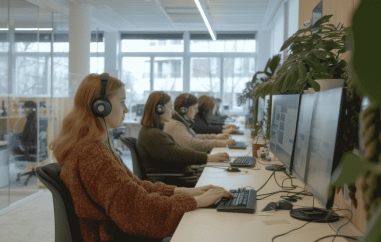Foreigner Welcome Center for Munich
The city of Munich is in urgent need of foreign workers, however, the path to their employment is marred by significant bureaucratic obstacles. The Green Party aims to rectify this situation with the introduction of a central hub that would not only streamline the process but also offer assistance for personal matters.
Olaf Zimmermann, CEO of Heizung Obermeier and Master Craftsman of his trade association, shared an anecdote about one of his employees, Mr. Alata from Peru. Mr. Alata expressed his eagerness to work as a technician, to which Zimmermann responded positively, stipulating the requirement of necessary documents such as residence and work permits, validated qualifications, and other pertinent paperwork. It took Mr. Alata a year and a half to gather all the necessary documentation before he could commence his employment.
Recognizing the protracted and arduous nature of this process, Munich's Second Mayor, Katrin Habenschaden of the Green Party, voiced her concern, stating, "This takes too long, and it's something we cannot afford." This sentiment has also resonated at the federal level, leading to the realization that given the prevalent shortage of skilled workers across various sectors, simplifying the immigration of qualified professionals from abroad is imperative. To address this, the Skilled Workers Immigration Act was enacted on July 7.
In a bid to further streamline this process, the Green Party, in collaboration with the Rosa List, has proposed the establishment of a "Welcome-Center" aimed at assisting incoming workers from both domestic and international origins. This center is envisioned as a local response to the federal legislation, translating theoretical legislative concepts into practical implementation, as articulated by Habenschaden during the presentation of the plan.
Julia Post, a Green Party councilor, explained that the Welcome-Center will serve as a central point for guidance and consultation. It will be set up within the administrative offices of the District Administration Office (KVR), where existing city services will be consolidated. The Social and Economic Departments along with the Job Center will contribute their expertise to the center's operations. However, Post emphasized that the center's role extends beyond fast-tracking newcomers into the job market, stating, "We also need to consider the private domain much more." This includes assisting individuals in finding housing, daycare centers, schools, as well as facilitating tasks like acquiring mobile contracts, internet connections, and setting up bank accounts.
Julia Post emphasized the paramount importance of social integration, noting, "The ultimate goal must be social integration, only then will people stay with us for the long term." She drew from her experience in Stuttgart, where a Welcome-Center already exists, designed to be accessible and inviting. Munich's Green Party envisions a similar "culture of welcome," complete with representatives who can communicate with new residents in their native languages. "The main languages are already available at the KVR," stated Katrin Habenschaden.
Ralf Suhre, Chief Executive of the trade association for plumbers, sanitation, and heating technology in Munich, noted that businesses welcome the idea of having bureaucratic responsibilities taken off their hands. He estimated the need for skilled professionals in his association alone to be in the thousands, and potentially tens of thousands across all trades combined. Suhre remarked, "We might be able to achieve the energy transition in fifty years with our current workforce, but if we're aiming for seventeen, we need more." The state has set a goal of being carbon-neutral by 2040. Zimmermann shared similar concerns, fearing that the transition might not proceed as swiftly as needed, leading to his current reality of having to turn down contracts due to a lack of personnel.
The shortage of skilled labor particularly affects small and medium-sized enterprises, which, as Mayor Habenschaden pointed out, form the backbone of Munich's economy. She underlined that this shortage poses a significant threat to both the local economy and Germany's prosperity. She expressed concerns about the far-right Alternative for Germany (AfD) party, known for its anti-immigrant stance, potentially deterring foreign talents from choosing Germany as their destination. Ralf Suhre reassured that his industry relies on foreign skilled workers, asserting, "We've been dependent on foreign skilled labor for decades."






 »
»